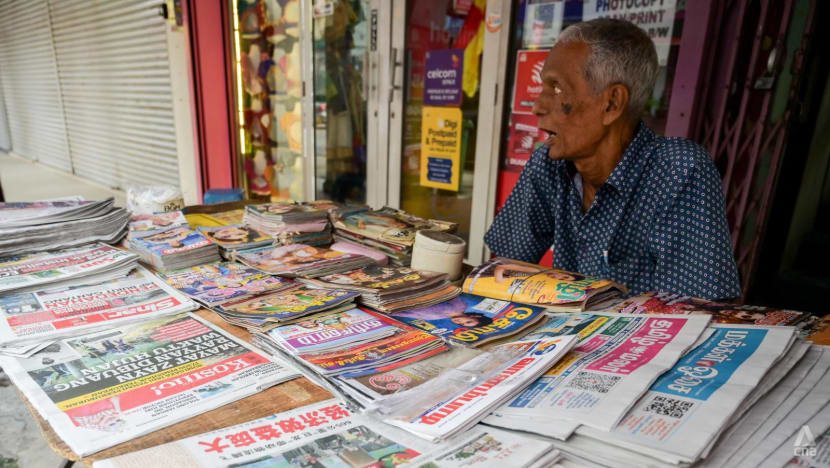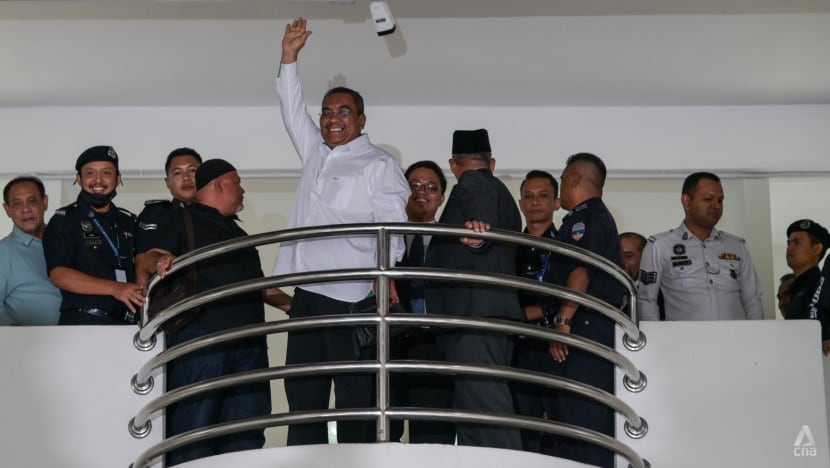Civil society groups call out Malaysian government's slow reforms on 'draconian' laws; fear Cabinet change may stifle progress
One analyst believes that reforming the laws may not be a priority for the government for now amid more pressing issues like the rising cost of living.

A news stand in Klang, Selangor that is selling various newspapers and magazines. The Malaysian government has been urged by civil society organisations to hasten the pace of reforms when it comes to freedom of expression. (Photo: CNA/Fadza Ishak)

This audio is generated by an AI tool.
KUALA LUMPUR: Several Malaysian civil society organisations (CSO) have urged the government to speed up legal reforms related to laws concerning freedom of expression, whose usage they said has seen a significant uptick over the past year.
One group has also expressed concern that the Cabinet reshuffle announced on Tuesday by Prime Minister Anwar Ibrahim may result in such reforms being slowed down further.
But an analyst whom CNA spoke to said that the laws were still necessary in a country like Malaysia while another believed that reforming them might not be a priority for the government for now.
The CSOs said that since the government was sworn in slightly more than a year ago, laws such as the Sedition Act and the Communications and Multimedia Act continue to be enforced.
This is despite Pakatan Harapan (PH) promising reforms of repealing these laws when campaigning during the 15th general elections in November last year.
PH now forms the unity government along with Barisan Nasional and several Borneo-based parties.
According to reports released by these CSOs, the number of incidents using these laws have risen in terms of usage compared to last year, some by two-fold.
They also said that the government’s failure to keep up with its promised reforms raises questions about its commitment to foster a more open and democratic society.
These organisations are also calling for urgent reforms to create a legal environment that protects the diverse voices and opinions that they deem are essential to a vibrant democracy.
USAGE OF RESTRICTIVE LAWS CONTINUES
A report on the state of freedom of expression in Malaysia by the Centre for Independent Journalism (CIJ) that was released on Dec 10 said there needed to be more progress regarding freedom of expression one year after the unity government was formed.
The report said that the lack of substantial reforms to address the historical limitations on freedom of expression is a “cause for concern as it reflected a persistence of restrictive practices historically used to suppress dissent and limit political discourse”.
It found that Section 233 of the Communication and Multimedia Act - which criminalises the improper use of network facilities or network services - has already been used 103 times this year up until November. This is compared to the 114 times the law was used for the whole of 2022.
The use of the Sedition Act, meanwhile, doubled from 15 cases last year to 31 cases this year while the Printing Presses and Publications Act 1984 (PPPA) has been applied seven times this year compared to three times in 2022, said the report.
The number of incidents cited in the CIJ report is based on media monitoring conducted by the organisation and covers investigations, arrests, and charges in court.
The report said that PH showed great promise in their election manifesto making pledges on establishing a media council, repealing draconian acts that suppress freedom of expression, enacting a Right to Information Act and protecting whistleblowers.
“However, the Madani framework released after the formation of the government put far less attention on the promises made in the PH manifesto,” the report said.
Malaysia Madani - or Civil Malaysia - refers to the slogan introduced by the current administration led by Mr Anwar.

Among those who have been charged under the Sedition Act include Kedah chief minister Muhammad Sanusi Mohd Nor as well as Parti Pribumi Bersatu Malaysia (Bersatu) information chief Razali Idris.
Sanusi was charged on Jul 18 with two counts of sedition for comments in a political speech earlier that month.
The first charge was in relation to him making seditious remarks against the Selangor ruler while the second charge was related to uttering seditious words regarding the establishment of the unity government.
Last month, Bersatu’s Razali was charged under the Sedition Act for claiming that the government controlled the judiciary as well as the Malaysian Anti-Corruption Commission (MACC).
And just last week, Malaysian police arrested a 36-year-old man after he expressed support for diplomatic relations with Israel in an interview with an Israeli social media influencer. According to local media, the man was investigated under the Sedition Act and the Communications and Multimedia Act.
As for the PPPA, it has been applied at least seven times this year with five bans enacted under the act - comprising four books and the banning of the Swatch Pride watch collection.
In May, a total of 172 watches, worth RM64,795 (US$13,900) were confiscated from several Swatch outlets all over the country for supposedly violating the PPPA, with Swatch contesting the ban in court.
And earlier in February, a woman was investigated under the same law for being in possession of 22,929 sex toys worth an estimated RM1.1 million during a raid at a warehouse in Penang.
According to various news reports, she was later fined RM5,000 after pleading guilty in court.
A report on civil and political rights by human rights organisation Suara Rakyat Malaysia (Suaram) on Dec 8 meanwhile said that there was significant regression when it came to freedom of expression.
It said that despite the government’s initiative to engage with stakeholders, the political will for substantive reforms to the Sedition Act and the Communications and Multimedia Act remained precarious.
“This is substantiated by the swift backpedalling to the narrative used by previous administrations of the adequacy of existing laws in tackling 3R (race, religion and royalty) matters, explicitly stated or implied,” said the report.
The report also said that lawmakers, including Mr Anwar, have continued to justify the continued application of the Sedition Act especially on the “basis of unavoidable necessity as to maintain national security and stability, and public order”.
The Suaram report also noted that Section 233 of the Communications and Multimedia Act continues to be widely used to address fake news and any online discourse that is deemed offensive.
It said that a significant example was the arrest and four-day remand of two 18-year-olds earlier in February for criticising this year’s Sijil Pelajaran Malaysia (SPM) – Malaysia’s equivalent of the O-levels – History paper.
“The ambiguous Section 233 provided law enforcement unfettered discretion in interpreting and enforcing the provision,” said the report, which added that there may be an increase in the use of the section of the law instead of the Sedition Act to investigate cases related to race, religion and royalty.
CIVIL SOCIETY WANTS SET TIMELINES ON REFORMS
Ms Wathshlah Naidu, the executive director of the Centre for Independent Journalism (CIJ) told CNA that there had been “positive” developments to fulfil certain promises such as the drafting of a new legislation on freedom of information (FOI) and efforts to establish a Malaysian Media Council.
She also noted that the Communications and Multimedia Act is being reviewed and there has been some engagement with relevant stakeholders but that at the same time, it was still used to censor speech and expression disproportionately.
She added that despite the government saying that the Sedition Act would be limited to issues on royalty, it has been used for a variety of issues in an arbitrary fashion.
Overall, Ms Naidu said that the government under the leadership of Mr Anwar had a long way to go in keeping its promises and maintaining its reform platform.
“It is time to demonstrate the commitment to the peoples in Malaysia and not let political expediency mar its track record,” she said.
Ms Naidu added that while change does not happen overnight, the government has had enough time to show commitments to move forward.
Separately, executive director of Suaram Sevan Doraisamy told CNA that civil society organisations wanted timelines on what the government was doing in regard to their promised reforms.
He said that laws such as the Sedition Act and the Communications and Multimedia Act had wide interpretations that were open to abuse by the authorities.
“We are disappointed with the progress of the government. We need to know how much time they need. They can’t keep on saying that they need more time while we have to keep guessing when changes are going to be made,” he said.
Mr Sevan was also concerned that the Cabinet reshuffle would cause more delays for any reforms that the government was looking into.
“A new minister will come in and say that he needs time to study the matter and the whole process repeats again,” he said.
Moving forward, both CIJ and Suaram have called for a review and eventual repeal of these laws, with a moratorium on their usage.
REFORMS OF LAWS WILL NOT BE GOVERNMENT PRIORITY: ANALYSTS
Political analysts, however, felt that the reforms on these laws would take a backseat compared to other issues facing the country and that the government may even use these laws to their advantage.
Professor James Chin at the University of Tasmania said that Mr Anwar and his government realised that the legal route was the easiest way to deal with people who are deemed to be against the government.
“These so-called draconian laws are the easiest way of handling critics … If you make it selective (against the opposition), that’s where all the problem starts,” he said, adding that criticism levelled against Mr Anwar for the slow pace of reforms was valid.
Prof Chin also believed that everyone should be able to say whatever they want as long as they are willing to be responsible and accountable for their own speech.
Nusantara Academy for Strategic Research senior fellow Dr Azmi Hassan said that there still was a need for the laws in Malaysia, citing the instance of Sanusi for touching on the subject of monarchy and race.
“I think Malaysia still needs preventive laws and measures. The reality is the government would have been advised on certain things they were not privy to when they were not in power.
“I don’t think you can expect total freedom of speech in Malaysia. It is not suitable,” said Dr Azmi.
Political analyst Dr Sivamurugan Pandian of University Sains Malaysia (USM) said that the main issue now faced by the people was the cost of living and that while certain issues such as reforms of laws were important, they were not considered to be a priority for the government.
“Mr Anwar is trying to gain Malay support. By making those kinds of reforms, would it translate to votes? He may want to prioritise things that will translate into votes,” he said.




















